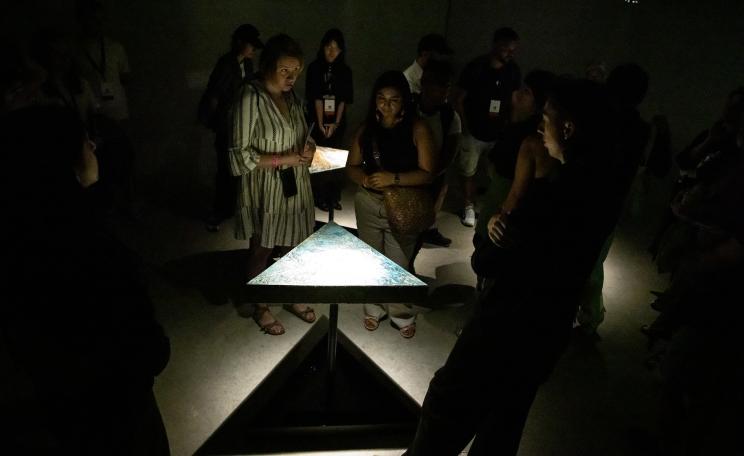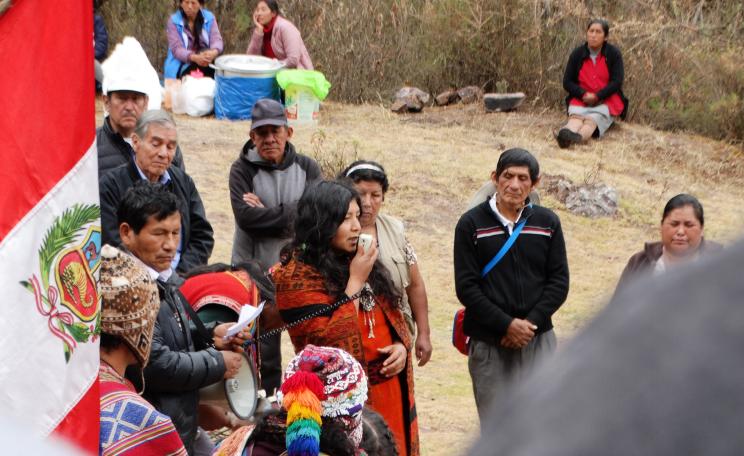I put forward a need for 'thoughtful mining': mining that not just minimises its impacts, but maximises its positive impacts on the human and natural world.
Green thinking has long been seeking to get beyond anthropocentrism, to build an understanding that we are part of complex systems of animals, plants and fungi.
Science has a growing understanding that even we as individuals are not just genetically human, but symbiotes, our microbiomes – gut, skin, lung and more – a crucial part of our continued functioning.
That the soils on which our food and oxygen depend are – when healthy – immensely complex ecological systems is also getting increasing attention.
Pollution
French philosopher Francois Laruelle talks about the MAP – Man Animal Plant - system. That’s progress, but there’s still something more that needs to be added to this – the inanimate systems on which we are also dependent - the rocks, the waters, the very fundamental basis of our world.
This issue was highlighted in the UK by the long and ultimately successful fight against fracking.
The argument from its proponents ran 'don’t worry about the earthquakes we’re causing, they’re really only very small'.
But this line did not really washing with the public, and we suddenly had cause to question the stability of the ground under their feet as never before in the generally very seismically stable UK.
It’s an uncertainty with which many other parts of the world, particularly the Global South, is all too familiar, with extractive industries frequently causing destruction to the very foundations of their worlds, whether the Brumhadinho dam collapse in Brazil or the pollution of essential water supplies in Papua New Guinea.
Emergency
The Green Economics Institute (GEI), working with the Green European Foundation, last weekend had a one-day conference on mining looking at these issues, and asking, “mining for metals, can it be fair?”
Much of the focus was on the problem of production of the renewable energy systems that we need to replace fossil fuel systems that threaten runaway climate change.
They require metals – and other materials – drawn from this inanimate world, in spaces, particularly in the Global South, where people and ecosystems are, inevitably, going to suffer damage as a result.
There’s been much focus on the need for rare earth elements for renewable energy systems, acknowledgement of the need for more basic metals, particularly steel – as the industry is all too keen to highlight.
I put forward a need for 'thoughtful mining': mining that not just minimises its impacts, but maximises its positive impacts on the human and natural world.
There’s also the little-considered issue of sand. Much talk about the climate emergency centres on the high-carbon cement industry, with much less discussion about the sand that it is mixed with that to build the green future we need.
Technical
Then also, in the wake of the great colonial-era “guano-rush”, one of the many pressing reasons for transforming our food production systems – fast – is peak phosphorus.
So how do we incorporate mining in the future as a sustainable part of human activity, particularly in the light of our climate emergency and biodiversity crisis? These are issues that will be acutely to the fore in the COP15 and COP26 talks.
The first thing that needs to be acknowledged is that it is impossible to mine metals or other materials without damage.
The environmental and social costs of mining can be reduced, managed, ameliorated, repaired after the fact perhaps - but the damage, to the fabric of the planet, to the ecosystems on it, to the people who live around a site, those on transport routes from it, to every human being in the use of energy, are all unavoidable.
The need to minimise all of those is obvious – and both a technical and a political problem.
Damage
But my answer to this question starts at the other end – at the end use. That mining should be conducted in the least damaging way possible should be a statement of the obvious. What’s too often not included as a crucial part of the assessment is what will this mined material be used for?
This is – just barely – starting to be thought about in energy policy. The cleanest, greenest, cheapest energy that you can possibly have is the energy you don’t need to use: energy efficiency should be the starting point, and the central point, of policy.
But there’s an even earlier primary question – do we need this structure, to do this activity, do the benefits outweigh the costs. And then there is the often unasked question: who benefits?
At the GEI event, Dr Enkhbayar Shagdar was reflecting on the massive damage done by mining in Mongolia, but also the need for the people of Mongolia for much of the products of mining, their level of access to the basics of life still being far below what’s needed for a decent life.
Some damage to the natural world to ensure that basic human needs are met remains necessary for a just transition for the whole world.
Natural systems
So what I put forward was a need for 'thoughtful mining': mining that not just minimises its impacts, but maximises its positive impacts on the human and natural world.
Materials extracted to aid the education of girls in the Global South, to extend telecoms infrastructure to them and provide individual internet access there, are very different in their impact to materials used to produce smart toasters, and much similar frippery, let along single-use items. Do we really need 'smart toasters'?
We’re used to the idea of environmental impact statements for mining, at least in the Global North, we should expect community impact statements, for the impact on humans.
But what’s also needed is a output impact statement – what positive impacts will the use to which these materials are put have on the planet, on human life and natural systems.
I was really pleased at a recent industry event to hear from a construction company spokesperson making the point that a first planning question should be: do we need this building at all? Could we construct one building instead of two or three?
Moratorium
How to frame this? Well my suggestion is using the Sustainable Development Goals. Delivering those goals, to which the whole world has agreed, requires, I propose, thoughtful mining - mining for the common good. A very different model to that of today.
Much of the conference discussion focused, rightly given its impacts, on mining on land. But it is also important to recognise that with our resource demands still rising fast, and political pressures on extractive industries to mitigate and militate their impacts growing, extractive industries are looking to new frontiers.
The seas that cover more than 70 percent of the surface of our planet are one part of this. The issues with that have recently been exposed with the revelation from Greenpeace that the UK, without publicity, a decade ago gave contracts to allow deep sea exploration for metals to the US military multinational Lockheed Martin, contracts that Greenpeace says are illegal from multiple angles.
And the frontier is far broader than that. China has become the second nation to successfully land a rover on Mars. The Financial Times has argued that extraterrestrial mining is “within the realms of the probable”.
We need to sort out what’s happening on the lands of this plan, before we even think of extending further. This only adds force to the calls for a moratorium on deep sea mining and for protection for the extraterrestrial environment, as provided by the Moon Treaty.
This Author
Natalie Bennet is a member of the Green Party and a member of the House of Lords.







